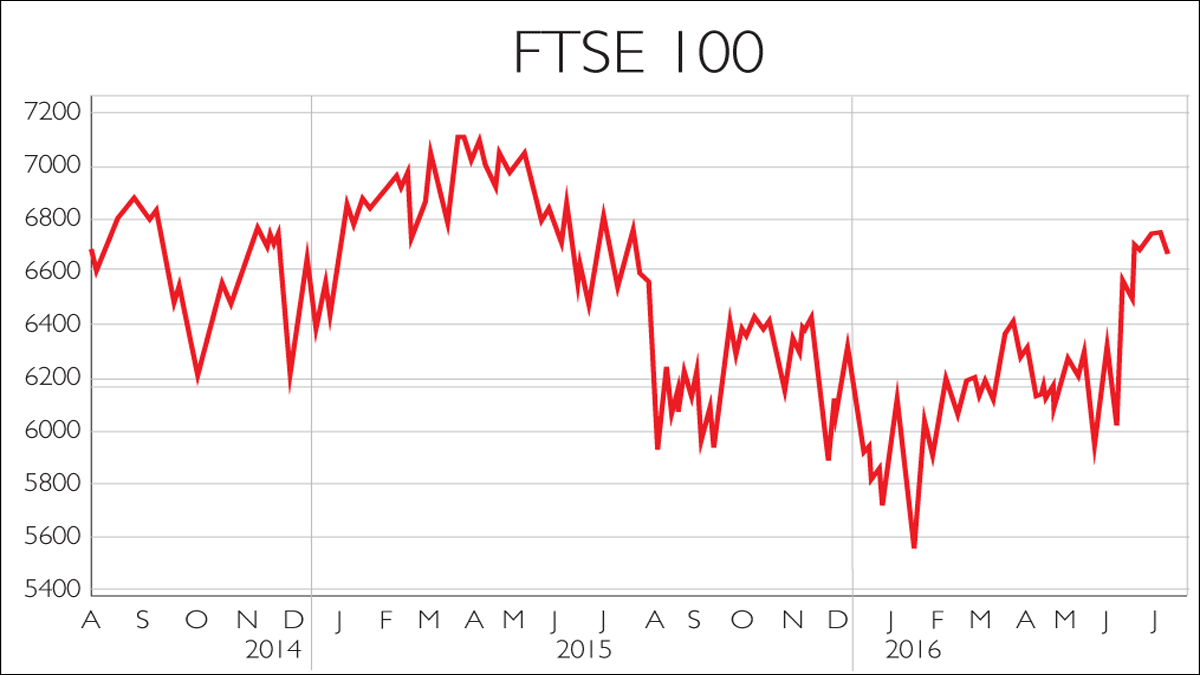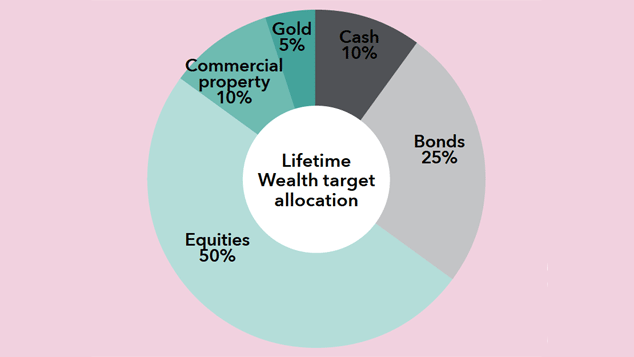Get the latest financial news, insights and expert analysis from our award-winning MoneyWeek team, to help you understand what really matters when it comes to your finances.
You are now subscribed
Your newsletter sign-up was successful
Want to add more newsletters?

Twice daily
MoneyWeek
Get the latest financial news, insights and expert analysis from our award-winning MoneyWeek team, to help you understand what really matters when it comes to your finances.

Four times a week
Look After My Bills
Sign up to our free money-saving newsletter, filled with the latest news and expert advice to help you find the best tips and deals for managing your bills. Start saving today!


Equities
Valuations stay reasonable
Stocks soon recovered from their Brexit-induced swoon at the start of July. The FTSE 100(above) hit a 12-month high and America's S&P 500 index hit a new record. European stocks, bedevilled by jitters over the banking sector, have failed to join the party, however, while Japanese equities have also struggled. The improved overall tone is due to expectations of yet more central-bank stimulus, which has trumped fundamentals for years now. Europe and Japan still seem the most likely candidates for further monetary easing, and cheaper valuations than on Wall Street also bode well.
Emerging markets have outperformed their developed-country counterparts this year, and the trend may well endure. A recovery in commodity prices, bolstered by a more stable Chinese economy, has helped improve sentiment. Higher US interest rates are always bad news for emerging markets, as the prospect of a higher US yield draws money away from riskier assets. So the new consensus that US interest rates are now unlikely to rise in September gives the rally further impetus.
MoneyWeek
Subscribe to MoneyWeek today and get your first six magazine issues absolutely FREE

Sign up to Money Morning
Don't miss the latest investment and personal finances news, market analysis, plus money-saving tips with our free twice-daily newsletter
Don't miss the latest investment and personal finances news, market analysis, plus money-saving tips with our free twice-daily newsletter
Finally, valuations remain reasonable. Our favourite countries are those with large domestic economies that can offset global turbulence, while a market-friendly political backdrop is always good news. By that token, we like India, Brazil and Vietnam.

Gold
Hang on to gold
Risky assets have largely shrugged off Brexit, sending gold prices down to finish the month flat. The yellow metal ticked up again in early August, however, as unexpectedly low US GDP in the second quarter means interest-rate hikes will be delayed. Higher rates are a headwind for gold, since it offers no yield. Gold is near two-year highs. With central banks likely to loosen monetary policy further, and a Trump victory in November possible, investors should ensure they hang on to it. It acts as a form of portfolio insurance against inflation and volatility, and should make up 5%-10% of your assets.

Bonds
Troubles continue
Japanese ten-year government bonds have posted their worst four-day run since 2003, sending the yield up by almost a quarter of a percentage point. The Bank of Japan's lack of action may havepersuaded investors that there will be no more bond-buying by the central bank, so there will be nobody to sell overpriced bonds on to. That notion seems premature, however, and government paper in general remains so pricey that over $12trn of it worldwide trades on a negative yield. If you are going to dabble in bonds, go for the safe credits with positive yields.

Cash
Expect rates to fall
A normal interest-rate environment looks further off than ever. RBS told 1.3 million business clients last week that record-low rates could prompt it to impose negative interest rates on deposits. This would make it the first bank in the UK to make customers pay for depositing cash although, as it stands, this would not apply to personal customers. The possibility of a further rate rise in the US has receded too.

Commercial property
Less of a risk this time around
Investors withdrew £1.4bn from commercial-property funds in June, according to the Investment Association 6% of the sector's total assets. Several funds remain closed to investor redemptions. Although the situation has echoes of the 2007-2008 crash, analysts at Societe Generale believe commercial real estate is "less of a risk this time round": prices have not risen at the same pace as in the residential sector.
The Lifetime Wealth portfolio

MoneyWeek's Lifetime Wealth portfolio is built around a simpleasset-allocation strategy based on the five main asset classes:stocks (both UK and international), bonds (conventional andinflation-linked), cash, property and gold. We allocate a certainpercentage of the overall portfolio to each asset class. You cansee our current target asset allocation in the chart on the right.
The portfolio is implemented through exchange-tradedfunds (ETFs) and index funds. Within each asset class wechoose these funds to weight the portfolio to the markets weconsider most attractive on a long-term view. For example,we can favour Japanese equities over American ones, orUK government bonds over US ones. We aim to minimiseunnecessary trading and to keep costs as low as possible.Lifetime Wealth is designed to be a sensible and low-hassleway to grow and manage your wealth over the long term. See here for more details.
Get the latest financial news, insights and expert analysis from our award-winning MoneyWeek team, to help you understand what really matters when it comes to your finances.
MoneyWeek is written by a team of experienced and award-winning journalists, plus expert columnists. As well as daily digital news and features, MoneyWeek also publishes a weekly magazine, covering investing and personal finance. From share tips, pensions, gold to practical investment tips - we provide a round-up to help you make money and keep it.
-
 Should you buy an active ETF?
Should you buy an active ETF?ETFs are often mischaracterised as passive products, but they can be a convenient way to add active management to your portfolio
-
 Power up your pension before 5 April – easy ways to save before the tax year end
Power up your pension before 5 April – easy ways to save before the tax year endWith the end of the tax year looming, pension savers currently have a window to review and maximise what’s going into their retirement funds – we look at how

